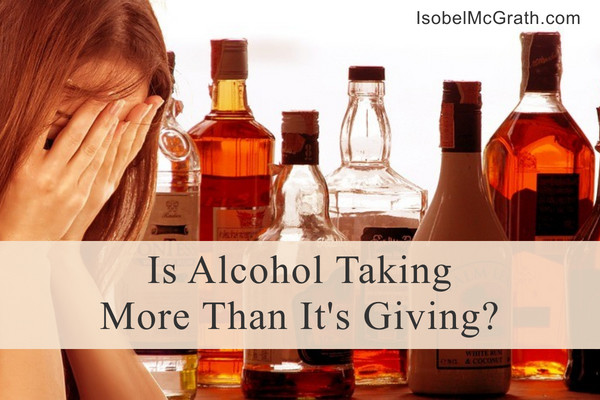Is Alcohol Taking More Than It Is Giving?
April is Alcohol Awareness Month, and this is a great time to assess your relationship with alcohol. Ask yourself: is Alcohol taking more than it is giving?
When the impact of your behavior is more negative than positive, a wise person would stop that behavior. If you find that stopping the behavior is not so easy, that is when you gain an awareness as to how ‘hooked” you truly are!
Alcohol: Culturally Accepted, Easily Addictive
Culturally, alcohol is an accepted legal adult drug. The definition of a drug is “a medicine or other substance which has a physiological effect when ingested or otherwise introduced into the body”. Because alcohol is a legal drug, we tend not to consider it as addictive and dangerous as other drugs.
However, it most certainly is a very dangerous drug. Alcohol causes addiction in people from all walks of life. When under the influence inhibitions are lowered and you are more likely to make decisions that are not in your best interest. Whether it be drinking and driving, hooking up with someone you shouldn’t, missing work, or being overly sensitive or aggressive at home or in public, alcohol causes behaviors that are personally and professionally destructive.
Binge Drinking on the Weekend?
In the past many people believed that only “full-time” alcoholics needed to quit drinking. Most wouldn’t consider drinking – even binge drinking – on the weekends a problem that required them to stop drinking. Don’t most people overdrink at the weekends? As long as you are meeting your responsibilities during the week, you don’t have an issue. Right?
Alcohol Changes Your Chemistry
Alcohol numbs your prefrontal cortex, that part of your mind that makes conscious decisions. So while you’re drinking, you no longer have the same cognitive ability to reel yourself in, this is why you have difficulty disciplining yourself to stick to your limit. Your inhibitions are lowered because your cognitive functioning is offline and you now have the self-discipline of an 8-year-old!
Additionally, Drinking alcohol regularly causes tolerance. It is a drug that requires more of it over time to get the same results.
The Mindful Drinking Movement
Thankfully, there is a new movement taking place, called “Mindful Drinking.” Nowadays, I find in my practice that people are becoming more aware of the negative impact alcohol is having in their lives, even if they would not be categorized as having an alcohol abuse issue.
My female clients who “love” their wine are finding that they are inconsistent in limiting their intake. They hate being unable to trust themselves to stop drinking as they agreed upon; once they have started drinking the limit increases. They report feeling more anxious and being in a negative mindset the next day. Their energy is low and although they promise themselves that they won’t drink for X amount of time, they find themselves giving in to the craving when “Wine O’Clock” comes around. They don’t need the extra calories, the low energy, and the negative thinking that ensues. Yet, they are inconsistent in keeping to the limit they set.
Assess Your Relationship with Alcohol
Mindful drinking, alcohol awareness, and dry months are an opportunity to assess your relationship with alcohol.
Ask yourself, “Can I stick to a self-imposed limit of alcohol?” If you’re unsure, set a limit before you plan to drink. Write it down, and review it afterward to see how you did.
Another good way to assess if alcohol is working for you is to do a “Pros and Cons” list. Be truthful with yourself, and be honest in your evaluation.
If you still can’t determine if alcohol is a problem, ask those closest to you if your behavior after drinking negatively impacts them.
How to Change Your Drinking Behavior
Tracking: keep a daily tally of how much you are drinking, and be honest about it.
Be compassionate with yourself: alcohol is the problem, not you. Research and my work in private practice have shown that beating yourself up will never lead to permanent change.
Seek support: there are offline and online support programs that are highly successful. From 12-step meetings to the sites listed below to individual private therapy, there are plenty of ways to find what you need to stop drinking and begin living your best sober life.
Resources for Your Best Sober Life
There are a wealth of resources and help available for changing your relationship with alcohol.
Alcoholics Anonymous
Quit Alcohol: Self-Help Hypnosis
Best Sobriety Apps for 2023
Tempest
She Recovers
Club SodaThe Alcohol Experiment
Private One-on-One Support to Stop Drinking
Feel like you need more support? For over 20 years, I have been working privately one-on-one with clients who want to stop drinking. For many, this was a more comfortable way for them to do it, as opposed to going to meetings. And that’s ok – whatever works for you is the best way to stop drinking.
To Your Health and Happiness,

Isobel McGrath is a licensed International Mental Health Counselor, Life Coach, and Certified Hypnotherapist located in St. Augustine, FL.
Isobel provides therapy, counseling, life coaching, and hypnosis in person at her St. Augustine Beach office, and through Telehealth. She is dedicated to providing exceptional, collaborative care, and truly cares about her clients and their well-being.
For more information about St. Augustine Therapist Isobel McGrath, please visit IsobelMcGrath.com, Mindful-Options.com, and 30SecondsOfCalm.com.

